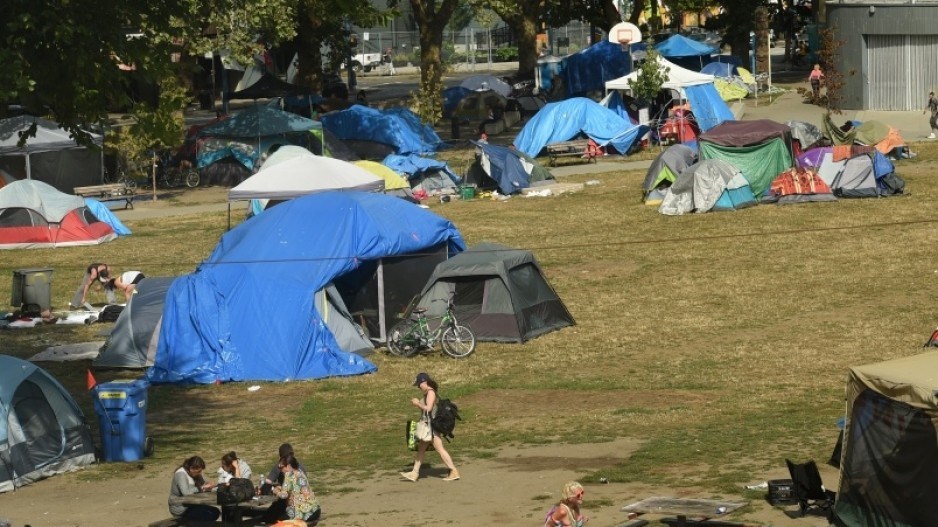The provincial government is imposing moratoriums on evictions in subsidized housing and making emergency welfare payments available for the poor who are affected by the COVID-19 management measures.
But there are serious questions about how public health officials can enforce social isolation and social distancing on the homeless in the Downtown East Side.
The answers that provincial ministers gave Saturday morning were not reassuring.
In a press conference Saturday morning, Municipal Affairs Minister Selina Robinson Housing, Social Development and Poverty Reduction Minister Shane Simpson, and BC Housing Minister Shayne Ramsay outlined plans to provide support for B.C.’s poor and vulnerable, many of whom live in either subsidized housing or shelters.
It includes a moratorium on evictions in subsidized housing, crisis supplements and emergency rent supplements for people on welfare, and a new vulnerable population working group.
But there are 70 to 80 people still living in tents in Oppenheimer Park, and apparently no immediate plan to move them out and into isolated supportive housing.
Simpson said meals are being delivered to residents of the park, allowing them to stay put, and said public health services (PHS) is working with residents to try to locate them in housing "as it becomes available."
But homeless shelters are already at capacity. Temporary winter shelters will remain open, and the province is working with Vancouver Coastal Health, the City of Vancouver and Downtown East Side Task Force to identify locations to be used to isolate people in homeless shelters, if they become infected with the virus.
"We know that in some buildings like SROs (single room occupancy) and shelters, it can be difficult to self-isolate and that is why we have conducted an inventory and are securing sites, including several here in Vancouver, to move people in," Ramsey said.
He said the province is looking at hotels, motels, temporary modular housing and community centres as options for housing people.
"When those spaces are needed, they will be ready to go."
There are concerns about homeless people in the Downtown East Side tightly lined up each morning to receive bagged breakfasts, putting themselves and front-line workers at risk to contracting the virus. Street vendors also continue to sell food from food stalls.
"As you will appreciate, social distancing in the community is very challenging," Simpson said. "We're working with the organizations there. We're working with them to look at how we improve that."
And rent is due at the end of the month, though if a low-income person has been laid off or otherwise unable to work do to virus management measures, there are fears they could be evicted if they can't pay their rent.
"I want to reassure those who are afraid of losing their homes because they can't pay their rent that help is on the way," Robinson said. "We have taken some first steps by making it clear to our non-profit partners that no one should be evicted from any B.C. Housing funded building due to non payment of rent during this crisis."
Asked if a similar moratorium can be expected for low-income people who don’t live in subsidized housing, but who live paycheque-to-paycheque and fear being evicted if they are laid off, Robinson said similar measures are coming soon.
A public health and provincial state of emergency has been declared, giving government the powers to enforce isolation measures.
But it may be difficult to insist that people stay at home when they are homeless and living in tent cities like Oppenheimer Park.
And if drug users are not afraid to share needles, it’s questionable whether they will be practising the kind of social distancing and sanitary measures that public health officials have said are “not an option.”
There are additional challenges when it comes to disease management when it comes to people living in tent cities, homeless shelters and transitional housing, private SROs and in social and supportive non-profit housing.
"These distinct living situations present distinct challenges in the case of a coronavirus outbreak," Robinson said. "That's why we are developing protocols to support isolation for people in each of these living situations. In some cases we will be able to work with providers to ensure that people can safely self isolate within their unit. In other cases, we may need to move one of many people to an offsite location for self isolation."
Robinson said social housing providers are having trouble getting basic medical and cleaning products they need to keep staff and residents safe.
BC Housing is centralizing procurement of those items and will commandeer the old Riverview Hospital property in Coquitlam to be used as a centralized distribution centre. Freezers will also be installed there to store thousands of frozen meals.
Robinson thanked front-line workers who are putting their own health at risk to continue helping vulnerable populations.
"Don't think your efforts aren't noticed or appreciated," Robinson said. "They are necessary, they are exceptional and we thank you."
She added that the measures announced Saturday is "just the beginning," and that more are coming.




